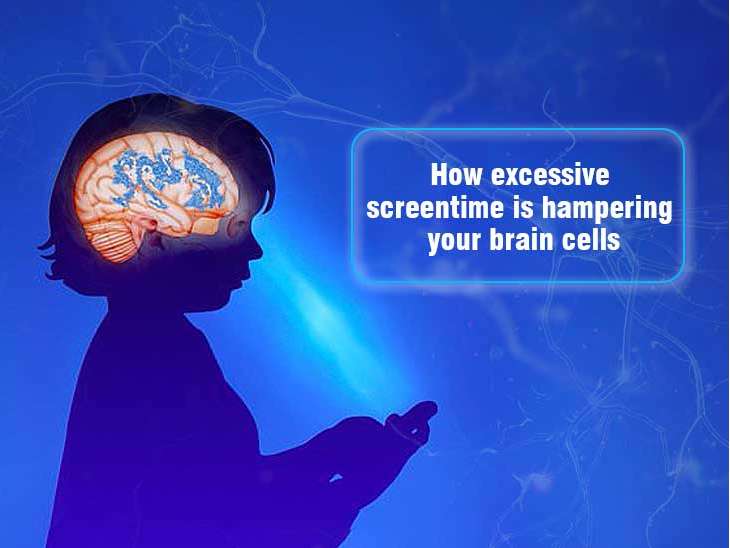How Excessive Screen Time Is Hampering Your Brain Cells
Tech Updates

There are screens everywhere you look—on phones, tablets, even watches. Teenagers use screens for an average of seven hours and 22 minutes per day, according to Common Sense Media. Additionally, studying on the computer is not included! According to studies, overusing screens might have an impact on your health.
Teenagers may be particularly at risk because adolescence is a crucial time for brain growth. Even while it can be entertaining to watch movies or text friends, it's important to set screen time limits.
Digital media consumption actively contributes to the growing human brain's ongoing process of creating new neural connections while removing inactive ones, according to Rich. According to him, a lot of what occurs on screen offers "impoverished" stimulation of the developing brain as compared to reality. Children require access to a variety of online and offline activities, as well as the freedom to let their thoughts roam. Here’s why—and how.
How Screentime is Affecting Your Brain and Body
Difficulty in Sleeping
A lot of screen time can make it difficult to sleep. You might use your smartphone later in the night. In response to darkness, your body produces a hormone called melatonin at night. Your body benefits by getting and staying asleep. Bright screen lighting can inhibit the generation of melatonin, keeping you alert.
Teenagers require a lot of sleep. Lack of sleep can weaken you and your immune system and increase your risk of getting sick. It may also impair your capacity for focus, learning, and memory. Your brain remembers what it has learned throughout the day while you sleep. This makes it possible to remember material when it's time for an exam.
Mood Swings
Your emotional well-being may be impacted by excessive scrolling and messaging. Researchers are still looking into the relationship between screen usage and mood. However, other research relates greater screen usage to more depressive symptoms.
Depression is highly influenced by a wide range of additional factors. According to other research, kids who spend too much time on screens may disregard their obligations, turn to screens to relieve stress or become concerned when they are not using them.
Block out
During your teen years, your brain goes through significant changes.
Your brain growth could be impacted by anything you go through at this period. Try new things, such as sports, music, and cooking, to challenge your brain so it can help you digest knowledge and solve difficulties in the future.
Screens might always be a part of your life, but that doesn't mean they have to take up the majority of it, according to Scholastic and the researchers from the National Institute on Drug Abuse, the U.S. Department of Health and Human Services and the National Institutes of Health.
Brain Modification
Your brain may physically change as a result of too much screen usage. The cortex is part of the brain's cortex that handles information processing.
Critical development of the cortex occurs during adolescence. Screen time might hinder its development. According to the Adolescent Brain Cognitive Development (ABCD) study, some children who use screens for more than seven hours per day have thinner cortexes than their peers. Future research aims to demonstrate how this will change children's brains over time.
Vision Issues
Computer vision syndrome (CVS), commonly referred to as digital eye strain, is a collection of eye and vision issues brought on by close-up tasks that are performed in conjunction with or while using a computer, tablet, e-reader, or smartphone. These signs can include double or blurred vision, burning, dryness, irritation, and eye pain, as well as neck and shoulder pain.
How can you combat or avoid these symptoms?
Avoid becoming sidetracked by digital media. Three-quarters of parents and half of all children believe that when they are speaking to one another, they are both distracted.
- Eat meals with your kids every day at a table without any screens.
- Put your device aside. Be there for others. Take note of your surroundings. Let your thoughts stray.
- Prevent using blue light-emitting screens right before bed.
- Play internet games with your kids instead of prohibiting it. As you play, teach them the game and encourage them to consider what they are seeing and doing on screen.
- To prevent them from falling into the depths of the screen abyss, assist your kids in making time management plans that prioritise critical and fun activities.
- Read a book instead of reading on your phone
Benefits of reducing your screen time
Better physical and mental health
Numerous health problems might result from excessive screen usage. It causes us to have trouble falling asleep because the blue light exposure from our displays throws off the internal clock in our bodies. It may also result in depression, weight gain, eye strain, headaches, and other health issues. In other words, limiting your screen time makes your body and mind healthier.
A rise in productivity
When you spend less time in front of the screen, you are less likely to check your phone for alerts, texts, or calendar reminders. You accomplish more because you are more committed to finishing the current work.
Stronger ties with family and friends
For less screen time, switching from online to in-person chats with friends and family makes it far simpler to establish common ground, pick up on non-verbal signs, and develop empathy. Your bonds with friends and family become stronger as a result.
Each movement counts
Don't worry about starting slowly; it's difficult to quit entirely cold turkey from the beginning. Start by eliminating a few social media apps for a week, or simply keep track of how much time you spend on each app. Try out the several suggestions above to discover which one suits you the best.
- How Excessive Screen Time Is Hampering Your Brain Cells
- Is screentime harming you
- how to avoid screentime
- what are disadvantages of screentime
- why we should avoid phones
- what mobiles and laptop doing to your brain
- why we should avoid mobilephones











